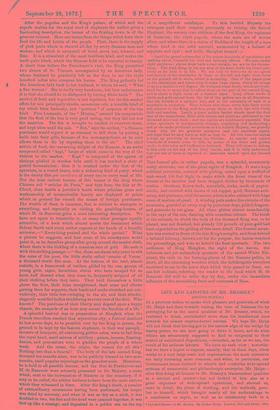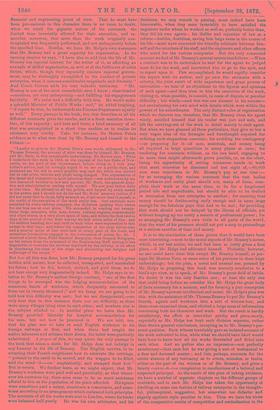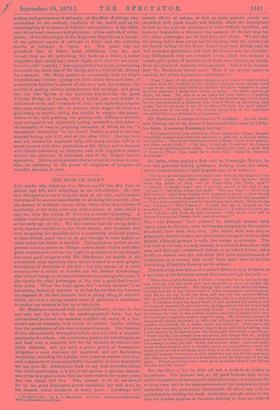LIFE AND LABOURS OF MR. BILASSEY.*
[SECOND NOTICE.] IN a previous notice we spoke with pleasure and gratitude of what. Mr. Helps had done towards raising the tone of business life by portraying for us the moral qualities of Mr. Brassey, which, we ventured to think, contributed more than his intellectual ones. towards his almost unprecedented success. We hope Mr. Helps will not think that having got in the narrow edge of the wedge by hearty praise, we are now going to drive it home, and do what critics are erroneously supposed to find so congenial to their soured or embittered dispositions,—demolish, as far as we can, the result of his arduous labours. We have no such view ; neverthe- leas we have a regret to express, namely, that in these days, when works on a very large scale and organisations the most extensive are daily becoming more common, and when, in particular, our Government seems inclined to absorb and centralise wide-spread systems of commercial and philanthropic enterprise, Mr. Helps— after first doing all honour to Mr. Brassey's transcendent qualities as a servant and master—has not looked at him also as a. great organiser of wide-spread operations, and showed us, more in detail, his plans of working, and the methods, pecu- liar to himself, which brought nearly all his undertakings to a conclusion BO rapid, as well as so satisfactory both in a • Life and Laboors of Mr. Braney. By Arthur Helps. London : Bell and Daldy. 1872.
financial and engineering point of view. That he must have been pre-eminent in this character there is no room to doubt, when we recall the gigantic nature of his contracts, the limited time invariably allowed for their execution, and re- member, moreover, that more than the work originally con- templated was frequently performed, and not unfrequently before the specified time. Besides, we have Mr. Helps's own assurance that Mr. Brassey had a great capacity for organisation. In his opening chapter he says, "I have also to add that the life of Mr.
Brassey has especial interest for the writer of it, as affording an example of skilful organisation, as well as of the fulfilment of other duties, which, though they especially concern imperial govern- rnent, may be thoroughly exemplified in the conduct of private enterprise, when it assumes considerable magnitude and diversity." And Count Cavour adds his very valuable testimony. "Mr.
Brassey is one of the most remarkable men I know ; clear-headed —cautious, yet very enterprising—and fulfilling his engagements faithfully. We never had a difficulty with him. He would make a splendid Minister of Public Works ; and," he added laughing, "if report be true, he understands the Finance Department equally as well." Every passage in the book, too, that describes at all his different contracts gives the results, and is a fresh assertion there- fore, of this capacity ; and here and there, a brief summary of all that was accomplished in a short time enables us to realise its existence very vividly. Take, for instance, Sir Morton Peto's evidence as to what was done by Mr. Brassey and himself in the Crimea :—
" I prefer to give in Sir Morton Peto's own words, addressed to Mr. Thomas Brassey, the account of what was done by himself, Mr. Brassey, and Mr. Betts, in this remarkable undertaking. Sir Morton says, ' When I undertook this work in 1854, at the request of the late Duke of New- castle, on the part of the Government, before doing so I took your father's advice, and he strongly urged it on me as a public duty, and promised me his aid in every possible way, and the whole was carried out at cost price, without any profit being charged. The organisation of the detail and transport—a most laborious duty—was undertaken by my late lamented brother-in-law and partner, Mr. Betts, the general direc- tion and administration resting with myself. We saw your father daily at this time. He advised on all the points, and helped by every means in his power, and I should not do his and Mr. B3tts' memory justice, if I did not state that to them, fully as much as, if not more than to myself, is the credit of the execution of the work really due. Our exertions were seconded by every railway company, the directors opening their stores for our free use at cost price. We succeeded in sending out twenty- three large steamers, with men, horses, railway engines, commissariat and other stores, in a very short space of time, and within the first twelve days of the arrival of the first convoy we laid seven miles of line ; and the soldiers handing shot and shell to each other were superseded to that extent in that time ; and before the completion of the siege thirty-nine and a quarter miles of line were laid to every part of the front, and steventeen locomotives engaged in the conveyance of stores, ete., &e. I received a letter from Field-Marshal Burgoyne, then General Burgoyne, on his return from the command of the Engineering Staff, stating it was impossible to overrate the services rendered by the railway, or its effect in shortening the time of the siege and alleviating the fatigues and sufferings of the troops.'"
But how all this was done, how Mr. Brassey prepared for his great battles with nature, how he collected, transported, and marshalled his forces ; how he fed, housed, clothed, and paid them, we do not hear except very fragmentarily indeed. Mr. Helps says in re- lation to Mr. Brassey's earliest foreign contract, "one of the first things to be arranged was the lodging accommodation of the numerous bands of workmen, which frequently amounted to from ten to twenty thousand ;" and we fancy we are going to be told how this difficulty was met; but we are disappointed,—we only hear that in this instance there was no difficulty, as there were many villages lying close to each other ; and nowhere else is the subject alluded to. In another place we learn that Mr. Brassey provided liberally for hospital accommodation for his men, but not how he procured it. We are told, too, that his plan was to take or send English workmen to his foreign railways at first, and when these had taught the native labourers and artisans their duties, the latter were gradually substituted. A propos of this, we may quote the only passage in -the book that raises a smile, for Mr. Helps does not indulge in any humour in his life of Brassey. The English navvies, in in- structing their French neighbours how to excavate the cuttings, "pointed to the earth to be moved, and the waggon to be filled, -said the word ' d—n ' emphatically, and stamped their feet." But to return. We further learn, as we might expect, that Mr.
Brassey's workmen were paid well and punctually, so that where- ever his contracts lay, there soon came to be as much assistance -offered to him as the population of the place afforded. His agents were sometimes paid a salary, sometimes a commission, and some- times according to an arrangement which embraced both principles. The accounts of all his works were sent to London, where his books were balanced half-yearly. He was his own arbitrator, and his decisions, we may remark in passing, must indeed have been honourable, when they seem invariably to have satisfied the engineers under whom he worked as well as, probably better than, they did his own agents ; his dislike and rejection of law as a referee—besides, doubtless, saving him large sums in the course of his life—must have cemented the friendly relations between him- self and the members of his staff, and the engineers and other officers who acted for the various companies. But the only connected account we find of Mr. Brassey's general system is as follows: —When a contract was to be undertaken he sent for the agent he judged most fit for the work, and instructed him to go to the spot, and to report upon it. This accomplished, he would rapidly consider the report with its author, and go over the estimates with a celerity, the joint result of wide experience and great powers of calculation—we hear of no objections to the figures and opinions of such agent—and then trust to him the execution of the work, visiting it, when possible, to consult, in eases of dispute or peculiar difficulty ; but wisely—and this was one element in his success— not encumbering his own mind with details which were within the powers of his subordinates. The only distinct rules of organisation which we discover are, therefore, that Mr. Brassey chose his agent wisely, satisfied himself that his tender was just and safe, and left the carrying-out of the work in detail mainly to such agent. But when we have gleaned all these particulars, they give us but a very vague idea of the foresight and forethought required for ordering such stupendous concerns ; for avoiding the contingency —or preparing for it- -of men, materials, and money being all required in large quantities in many places at once ; for tendering for contracts without, on the one hand, engaging to do more than might afterwards prove possible, or, on the other, losing the opportunity of setting numerous hands to work that must otherwise be dismissed and lost sight of,-80,000 men were sometimes in Mr. Brassey's pay at one time ;- for so arranging the various contracts that the vast bodies of workmen and costly plant should not, many of them, com- plete their work at the same time, to lie for a lengthened period idle and unprofitable, but should be able to be drafted in succession from one enterprise to another ; for ensuring that money should be forthcoming early enough and in sums large enough for the fabulous pays that had to be met ; for providing that work should not be delayed by the illness of officials, yet without keeping up too costly a reserve of professional power ; for so arranging Mr. Brassey's own visits to all parts of the world, that the want of his presence should not pat a stop to proceedings at a serious sacrifice of time and money.
It is to the elucidation of these points that it would have been most interesting,—next to the moral aspects of Mr. Brassey's career, which, in our last notice, we said had been so justly given a first place,—if Mr. Helps had addressed himself. Probably, however, no one could have done this except Mr. Brassey himself, or per- haps Sir Morton Peto, or some other of his partners in these huge undertakings; but the plan, a novel and unusual one, pursued by Mr. Helps in preparing this book was scarcely conducive to a bird's-eye view, so to speak, of Mr. Brassey's great field of battle. No doubt it was the only feasible one ; at least the only one that could bring before an outsider like Mr. Helps the great body of facts necessary for a memoir, and for forming a just conception of Mr. Brassey's powers intellectual and moral. Mr. Helps's plan was this: with the assistance of Mr. Thomas Brassey he put Mr. Brassey's friends, agents and workmen into a sort of witness-box, and there cross-examined them, and elicited a large mass of information concerning both his character and work. But the result is hardly satisfactory, the effect is somewhat patchy and piece-mealy, especially as Mr. Helps has kept each division separate, rather than drawn general conclusions, excepting as to Mr. Brassey's per- sonal qualities. Each witness inevitably gave an isolated account of the work entrusted to him, while what we should have liked would have been to know how all the works dovetailed and fitted into
other. And we gather also an impression—not perfectly satisfactory—that each felt he was giving a sort of testimonial to a dear and deceased master ; and this, perhaps, accounts for the entire absence of any testimony as to errors, mistakes, or faults, either on the part of the witness or of Mr. Brassey, and gives a faintly couleur-de-rose complexion to recollections of a beloved and respected principal. As the result of this plan of taking evidence, we have a number of separate chapters on the different groups of contracts, and in each Mr. Helps has taken the opportunity of dwelling on some one feature of railway enterprise in the thought- ful, philosophical, suggestive, but somewhat too didactic and slightly egotistic style peculiar to him. Thus we have his views of the comparative merits of competition and centralisation in the making and government of railways ; of the effect of railway com- munication on the sanitary condition of the world, and on the intermingling of workmen of different nationalities ; of the differ- ence of national character and physique ; of the methods of coloni- sation; of the advantages of the Argentine Republic as a colony ; of the political results of railways in Italy, and the civilising results of railways in Spain, &c. But space has not permitted him to follow these reflections very far, and though they are all interesting, the book, as a whole, is rather suggestive than satisfying ; rather alight, and what we are accus- tomed to call "remarky ;" attempting rather too much, —containing somewhat too much also of Mr. Helps, and too little of Mr. Brassey for a memoir. Mr. Helps amuses us occasionally with his simple unprofessional wonder ; giving us a little detail, here and there, of construction familiar to almost all out-door men, for instance, the method of making railway embankments and cuttings ; and going into the vast figures of the materials required for the great Victoria Bridge of Canada, with a boyish awe and delight in millions of rivets and thousands of tons ; and expressing surprise that some workpeople like to wait for their wages till there is a good lump to receive, taking the trouble to explain this pheno- menon to us ; and pointing out gravely—the difference between sand and granite not apparently having occurred to him before— the necessity of care in preparing estimates, of which he has "a remarkable illustration" in the Yeovil Tunnel, a yard at one end whereof having cost £.12, and at the other 2.120. Bat the book was not written for engineers only, and many readers will be as much amused with these particulars as Mr. Helps, and it abounds with details interesting to everyone, and with suggestive matter worthy the attention of statesmen and of Mr. Helps's literary reputation. But its all-important characteristic is, without a clues lion, its testimony to the power of singleness of purpose—of unselfish devotion to duty.




































 Previous page
Previous page